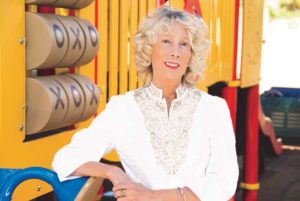By Emily Battle
Betsy Pfromm ’71 says serendipity took her from sociology student to CEO of the Los Angeles Child Guidance Clinic, an organization that promotes the mental health of children and families in high-poverty areas of Central and South Los Angeles.
But the twists and turns of her career can be tied to the first time she stepped into a classroom of crying 6-year-olds.
Pfromm wasn’t sure what career she wanted when she graduated from what was then Mary Washington College of the University of Virginia. But she felt the liberal arts background gained at MWC had given her a strong foundation. “More than anything, my critical-thinking skills were well-honed,” she said.
With jobs scarce for sociology majors, she took a position as a first-grade teacher in a rural Virginia school. Many of her students came from impoverished households. Most had never been away from home in this era before universal kindergarten and Head Start.
Pfromm saw enormous emotional needs, and she wanted to help the children develop a sense of social well-being. Reading groups, she found, let students share their feelings about situations a book’s characters faced.
“Over time, hit and miss, it kind of worked out,” Pfromm said. “It opened my mind to how early childhood experiences can really affect a child’s learning.”
That epiphany stayed with Pfromm as she earned a master’s degree from James Madison University, spent more than 15 years as a public health administrator in Virginia, and earned a Master of Public Administration degree from Harvard University.
When she graduated from Harvard, a friend suggested that she work for the Los Angeles Child Guidance Clinic. Pfromm had intended to stay on the East Coast, but a board member persuaded her to come out for a visit.
She saw that most of the children served by Child Guidance Clinic were 14 or older. Pfromm argued for services for children 5 and younger, with the aim of reducing the number who would need help down the line.
She hit the ground running with a $10 million capital campaign to build a new home for the clinic, which was losing the space it had occupied on the University of Southern California campus.
She worked with community groups to promote neighborhood safety and to increase funding for mental health services.
A program she launched called Building Blocks sends the clinic’s resources into preschools and offers weekend training sessions for preschool teachers. In 2003, it won the Norbert and Charlotte Rieger Service Program Award for Excellence from the American Academy of Child and Adolescent Psychiatry.
Pfromm retired in 2016 as CEO of the Child Guidance Clinic but ran the organization’s policy and training institute until she fully retired at the end of 2017. She remains engaged in promoting the importance of young children’s mental well-being, a need she calls critical to the country’s economic and social health.
She’s never forgotten where she first saw that principle in action – in a Virginia first-grade classroom.
“That experience has so much informed the work I have done since then,” she said.

